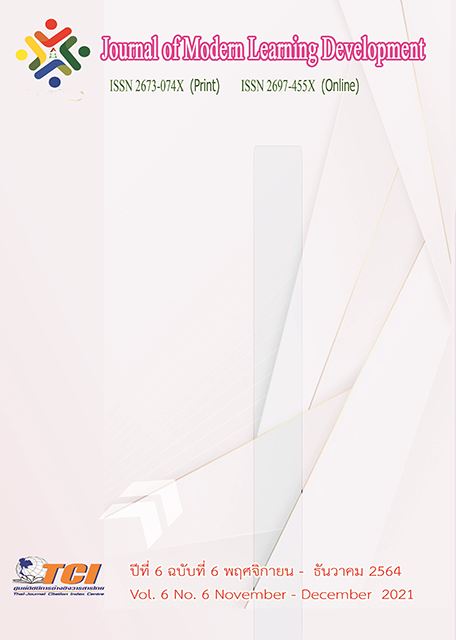Motherhood in Buddhism
Main Article Content
Abstract
Mother has a duty to create the world because of the character of the child who was born to be a good citizen of the world. A mother's duty to the family institution is essential in passing on a good example to her children. Because duty is a guide, action is a crucible for life and mind to follow the pattern that has been passed on from mother and father. Motherhood that appears in the Tripitaka scriptures Mother in the Brahma Sutra The Lord Buddha has shown that there are 4 foundations for the mother Brahma, Grand Master, Burathep and Ahunai people. Buddhism regards parents as the brahma of their children. because he performs duties like Brahma, such as giving birth to children, raising children Show this world to her children. In terms of virtues, mothers have 4 Brahma Viharas, namely mercy, compassion, mudita, upekkha, and the duties of mother and father in the six directions. Mothers and fathers are obligated to support their children as follows: to be in good to study the arts and sciences, to advise suitable spouses and to hand over wealth in a reasonable time
Article Details
References
ประยงค์ สุวรรณบุบผา. (2537). สังคมปรัชญา แนวคิดตะวันออก – ตะวันตก. กรุงเทพมหานคร: โอ.เอส พริ๊นติ้งเฮ้าส์.
พระธรรมโกศาจารย์ (ปัญญานันทภิกขุ (มปป.: 7). หน้าที่ของคน. กรุงเทพมหานคร: สำนักพิมพ์ธรรมสภา.
พระธรรมโกศาจารย์. (2543). ความรักของแม่. กรุงเทพมหานคร: สำนักพิมพ์ธรรมสภา.
พระธรรมปิฎก (ป.อ. ปยุตฺโต). (2543). ความสุขของครอบครัว คือสันติสุขของสังคม. กรุงเทพมหานคร: มูลนิธิพุทธธรรม.
พระธรรมปิฎก (ป.อ. ปยุตฺโต). (2542). จากสุขในบ้านสู่ความเกษมศานต์ทั่วสังคม. กรุงเทพมหานคร: สหธรรมิก.
พระธรรมปิฎก (ป.อ. ปยุตฺโต). (2546). พัฒนาการ แบบองค์รวมของเด็กไทย. กรุงเทพมหานคร: โรงพิมพ์พระพุทธศาสนาของธรรมสภา.
พระพรหมคุณาภรณ์ (ป.อ. ปยุตฺโต). (2543). ความสุขของครอบครัว คือสันติสุขของสังคม. กรุงเทพมหานคร: มูลนิธิพุทธธรรม.
พระพรหมคุณาภรณ์ (ป.อ. ปยุตฺโต). (2551). พจนานุกรมพุทธศาสน์ ฉบับประมวลศัพท์. ชำระ-เพิ่มเติม ช่วงที่ 1. กรุงเทพมหานคร: โรงพิมพ์มหาจุฬาลงกรณราชวิทยาลัย.
พระพรหมคุณาภรณ์ (ป.อ. ปยุตฺโต). (2550). คุณบิดามารดา สุดพรรณนามหาศาล. กรุงเทพมหานคร: สำนักพิมพ์วัลลดา.
พุทธทาสภิกขุ. (2546). ปัญหาของมนุษย์. กรุงเทพมหานคร: สำนักพิมพ์สุขภาพใจ.
พุทธทาสภิกขุ. (2521). รากฐานที่มั่นคงแห่งความเป็นมนุษย์. กรุงเทพมหานคร: สำนักพิมพ์ธรรมสภา.
มหาจุฬาลงกรณราชวิทยาลัย. (2539). พระไตรปิฎกภาษาไทย ฉบับมหาจุฬาลงกรณราชวิทยาลัย. กรุงเทพมหานคร: โรงพิมพ์มหาจุฬาลงกรณราชวิทยาลัย.
มหามกุฏราชวิทยาลัย. (2538). มังคลัตถทีปนีแปล เล่ม 2. (พิมพ์ครั้งที่ 10). กรุงเทพมหานคร: มหามกุฎราชวิทยาลัย.
ราชบัณฑิตยสถาน. (2540). โลกนีติ-สุตวัฑฒนนีติ. กรุงเทพมหานคร: ราชบัณฑิตยสถาน.
ราชบัณฑิตยสถาน. (2537). ราชนีติ-ธรรมนีติ. กรุงเทพมหานคร: ราชบัณฑิตยสถาน.
ราชบัณฑิตยสถาน. (2554). พจนานุกรมฉบับราชบัณฑิตยสถาน พ.ศ.2554. (พิมพ์ครั้งที่ 2). กรุงเทพมหานคร: นานมีบุ๊คส์
ศรีเรือน แก้วกังวาล. (2553). จิตวิทยาพัฒนาการชีวิตทุกช่วงวัย (เล่ม 1) แนวคิดเชิงทฤษฏี-วัยเด็กตอนกลาง. กรุงเทพมหานคร:ห้างหุ่นส่วนจำกัด สามลดา.
สัญญา สัญญาวิวัฒน์. (2541). ทฤษฎีและกลยุทธ์การพัฒนาสังคม. กรุงเทพมหานคร: โรงพิมพ์จุฬาลงกรณ์มหาวิทยาลัย
Radcliffe-Brown. A.R. (1935). On the Concept of Function in Social Scienee. American Anthropologist


